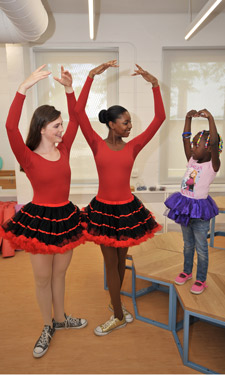 The communities surrounding Chicago’s Carver Park are experiencing a health crisis. Residents of the Altgeld Gardens, Riverdale, Golden Gates and Concordia neighborhoods live in what Chicago Park District (CPD) Wellness Director Colleen Lammel-Harmon calls a “wellness dessert.” “Consisting primarily of government and low-income housing, families here have limited public transportation options, just one centrally located park — Carver Park — and one grocery store,” she says. “The next closest park is over a mile away. In addition, these communities have historically had challenges working together, leaving a disparity in resources and diminished outcomes.”
The communities surrounding Chicago’s Carver Park are experiencing a health crisis. Residents of the Altgeld Gardens, Riverdale, Golden Gates and Concordia neighborhoods live in what Chicago Park District (CPD) Wellness Director Colleen Lammel-Harmon calls a “wellness dessert.” “Consisting primarily of government and low-income housing, families here have limited public transportation options, just one centrally located park — Carver Park — and one grocery store,” she says. “The next closest park is over a mile away. In addition, these communities have historically had challenges working together, leaving a disparity in resources and diminished outcomes.”
Meanwhile, across Chicago, health statistics for young people — girls and boys, but particularly those of color — are alarming. “Data from the 2009 Centers for Disease Control and Prevention (CDC) Youth Risk Behavior Survey shows that the prevalence of overweight high school students in Chicago is significantly higher than the rest of the nation — 21 percent versus 16 percent,” Lammel-Harmon adds. “Compared with figures of all U.S. high school students, a higher percentage of those in Chicago do not eat green salad, fruit and other vegetables…only 27 percent of teen girls get at least an hour of exercise five days a week, compared to 38 percent of their male counterparts. There are also racial and ethnic disparities — a higher proportion of black (22.6 percent) and Hispanic/Latino (22.4 percent) Chicago high school students are overweight, compared with 11.8 percent of white students.”
Lammel-Harmon and her colleagues realized there was something that could be done immediately to close the wellness gap between teen residents served by Carver Park and their healthier counterparts. This summer, a variety of new programs have been implemented to give these teens powerful tools to take control of their health and future success. They’re receiving the skills — and the philosophical agency — to make proactive lifestyle changes that will vastly improve the quality of their lives for the long-term.
Growing and Cooking Fresh Food
Residents of low-income neighborhoods rely on food that is inexpensive and readily available. Without transportation, families must make do with offerings at the corner market or discount grocery chain, which often are higher in fat and preservatives, lower in healthy nutrients and do not include fresh fruit and vegetables.
But, initiatives like the Altgeld Gardens Community Farm, established 2010 through an alliance between CPD and Growing Power Inc., create spaces for teens and whole families to grow their own fresh produce. For six weeks during the summer, teens take the fruits and veggies they grow at Atgeld Gardens to Carver Park, where they learn vital cooking skills from “Chef Fresh” and “Chef Barb.” Complementary classes like “Fun with Food” teach young girls creative ways to cook easy, healthy meals through hands-on instruction.
Exercise and Healthy Activity
Carver Park teens can choose from a variety of programs designed to get them active and interested in fitness. Creative approaches — like offering dance classes, kickboxing, yoga and Pilates — ensure teens of both sexes and with widely differing interests have appealing choices. There’s also sports conditioning sessions that focus on improving cardiovascular health, muscle strength and endurance.
All these classes are tailored specifically for teens and all, including the above-mentioned gardening and cooking programs, are offered free of charge.
Hopefully by the time the 125 teens already served by Carver Park’s programming begin their own families, hundreds more will have learned and applied the same skills and information, effectively transforming the health landscape of their community. Robust, targeted and creative park and recreation programming may not solve all of society’s ills, but it can help to put all of us on equal footing when it comes to health and quality of life.
Samantha Bartram is the Executive Editor of Parks & Recreation magazine.

